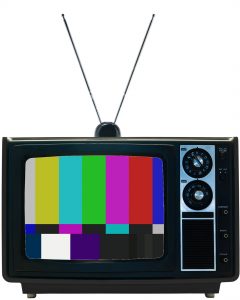/* Hannah Cai
Section C
hycai@andrew.cmu.edu
Project-06-Abstract Clock
*/
function setup() {
createCanvas(480,480);
background(255);
}
function draw() {
//background
//wall
noStroke();
fill(222, 255, 251);
rect(0, 0, 480, 420);
//table
fill(255, 192, 224);
rect(0, 380, 480, 90);
//tv
//antennae base
fill(0);
ellipse(233, 165, 40, 40);
//antennae
stroke(0);
strokeWeight(2);
line(185, 35, 220, 150);
line(285, 35, 245, 150);
//antennae tips
strokeWeight(5);
point(185, 35);
point(285, 35);
//feet
noStroke();
fill(255);
rect(115, 408, 20, 10, 0, 0, 3, 3);
rect(340, 408, 20, 10, 0, 0, 3, 3);
//base
fill(40);
rect(104, 398, 265, 10);
//body
rect(66, 165, 345, 233, 13, 13, 25, 25);
fill(0);
rect(76, 172, 325, 220, 13, 13, 25, 25);
//screen
noStroke();
fill("White");
rect(108, 213, 192, 138, 25, 25, 28, 28);
//control bar
fill(80);
rect(327, 185, 45, 190, 3, 3, 3, 3);
fill(0);
rect(329.5, 269, 40, 11);
rect(329.5, 283, 40, 90);
//knob 1
fill(0);
ellipse(350, 207, 36, 36);
fill(80);
ellipse(350, 207, 12, 12);
stroke(0);
strokeWeight(2);
line(350, 188, 350, 220);
//knob 2
fill(0);
ellipse(350, 247, 30, 30);
fill(80);
ellipse(350, 247, 8, 8);
line(350, 230, 350, 233);
//other knobs
fill(40);
ellipse(387, 196, 14, 14);
ellipse(387, 216, 11, 11);
noFill();
stroke(255);
strokeWeight(1);
ellipse(387, 271, 8, 8);
ellipse(387, 312, 8, 8);
ellipse(387, 354, 8, 8);
//time variables
// var H = hour();
// var M = minute();
// var S = second();
var H = hour();
var M = minute();
var S = second();
//maps time to screen width
var mappedH = map(H, 0, 24, 0, 192);
var mappedM = map(M, 0, 60, 0, 192);
var mappedS = map(S, 0, 60, 0, 192);
//color blocks
push();
blendMode(DIFFERENCE); //overlays the screen colors
noStroke();
fill("Red");
rect(108, 213, mappedH, 138);
fill("Green");
rect(108, 213, mappedM, 138);
fill("Blue");
rect(108, 213, mappedS, 138);
pop();
//screen border
noFill();
stroke(0);
strokeWeight(20);
rect(98, 205, 212, 153, 32, 32, 38, 38);
stroke(40);
strokeWeight(2);
rect(90, 200, 227, 163, 4, 4, 7, 7);
}
For this project, I was initially planning to just have a simple square with overlaid colors, but while writing that code, I was reminded of old tvs, especially those with glitched screens:
I was inspired by that idea, so I sketched up a tv in Illustrator, put it into p5, and then modified my code so that the colors would fit to the screen.
The color layers are red, blue, and green (RBG) under the blend mode “difference,” so as they overlap and interact with each other, the screen’s color palette changes. The colors on the screen do not change only by the minute, but also by the time of day (based on the position of the hours, minutes, and seconds layers in relationship to each other).
![[OLD FALL 2018] 15-104 • Introduction to Computing for Creative Practice](wp-content/uploads/2020/08/stop-banner.png)